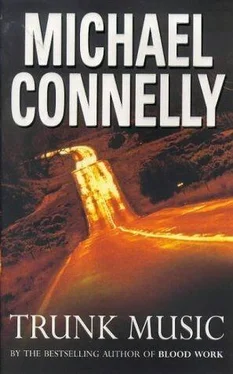After the dealers came Aliso’s favorite sports book clerk. She was a mousy-looking bottle-blonde named Irma Chantry. She lit a cigarette as soon as she sat down and talked in a voice that indicated she had never gone long without a smoke. She said that on both of the last two nights Aliso had been in town he had bet on the Dodgers.
“He had a system,” she said. “He always doubled up until he won.”
“How do you mean?”
“Well, that first night he put a grand down on the Dodgers to win. They lost. So the next day he comes in and puts down two big ones on them again. They won. So after you take out the casino vig, he was almost a grand up for the trip. Except he never picked it up.”
“He didn’t collect?”
“Nope. But that’s not unusual. His chit was good as long as he kept it. He could come in anytime and we’d stick it in the computer. It’d happened before. He’d win but he wouldn’t collect until the next time he was in town.”
“How do you know he didn’t take it to another clerk?”
“Tony wouldn’t do that. He always cashed out with me, that way he could tip me. He always said I was his lucky charm.”
Bosch thought a moment. He knew the Dodgers had played at home Friday night and Aliso’s plane left Las Vegas at ten. Therefore, it was a pretty safe bet that Aliso had to be at McCarran International or already on his plane heading back to L.A. before the game was over. But there was no betting receipt found in his wallet or on his person. Harry considered the missing briefcase again. Would it have been in there? Could a betting slip worth four thousand dollars minus the vig be motive for his murder? It seemed unlikely, but still, it was something to pursue. He looked at Irma, who was drawing so hard on her cigarette that he could see the outline of her teeth on her cheeks.
“What if somebody else cashed the bet? With another clerk. Is there any way to tell that?”
Irma hesitated and Meyer broke in.
“There’s a good chance,” he said. “Each receipt is coded with a clerk number and time the bet was placed.”
He looked at Irma.
“Irma, you remember taking very many two-thousand-dollar bets on the Dodgers on Friday?”
“Nope, not a one, other than Tony’s.”
“We’ll get on it,” Meyer said to Bosch. “We’ll start going through the cashed receipts going back to Friday night. If Mr. Aliso’s bet was cashed, then we’ll know when it was cashed and we’ll have video of who cashed it.”
Bosch looked at Irma again. She was the only one of the casino employees he had talked to who had referred to Aliso by his first name. He wanted to ask her if there was something more than a gambling relationship between them. But he knew that it was likely that employees were forbidden by the casino to date or fraternize with the guests. He couldn’t ask her in front of Meyer and expect a straight reply. He made a mental note to track Irma down later and then excused her from the interview.
Bosch looked at his watch and saw he had forty minutes until the conference call with Billets and the others. He asked Meyer if he’d had a chance to get the surveillance tapes from the eye in the sky over the poker pit for Thursday and Friday.
“I just want to see the guy gambling,” he said. “I want to get a feel for him in life.”
“I understand and, yes, the tapes are ready for viewing. I told you we wanted to cooperate completely.”
They left the office and walked down a corridor to a tech room. The room was dimly lit and very quiet except for the thrum of an air conditioner. There were six consoles arranged in two lines where men in gray blazers sat and watched banks of six video monitors per console. On the video screens Bosch could see various overhead views of gambling tables. Each console had an electronic control board that allowed the operator to change focus or magnification of a particular camera view.
“If they wanted to,” Meyer whispered, “they could tell you what cards a player is holding at any black jack table in the house. It’s amazing.”
Meyer led Bosch to a supervisor’s office off the tech room. There was more video equipment as well as a bank of tape storage units. There was a small desk and another man in a gray blazer sat behind it. Meyer introduced him as Cal Smoltz, the supervisor.
“Cal, are we set up?”
“This screen here,” Smoltz said, pointing to one of the fifteen-inch monitors. “We’ll start with Thursday. I had one of the dealers come in and ID your guy. He shows up at eight-twenty on Thursday and plays until eleven.”
He started the tape. It was grainy black and white, similar to the quality of the Archway surveillance tape, but this one was filmed in real time. No jerking movements. It began with the man Bosch recognized as Aliso being led to an open chair at a table by a pit boss. The pit boss carried a rack of chips which he put down on the table in front of Aliso’s spot. Aliso nodded and exchanged smiles with the dealer, a woman Bosch had interviewed earlier, and began to play.
“How much in the rack?” Bosch asked.
“Five hundred,” Smoltz said. “I’ve already gone through this on fast speed. He never buys another rack and at the end when he cashes out, he looks like he’s just shy of a full rack. You want it on real time or fast speed?”
“Speed it up.”
Bosch watched closely as the tape sped through the hours. He saw Aliso take four gin and tonics, fold early on most of the deals, win five big pots and lose six others. It was pretty uneventful. Smoltz slowed the tape down when the time counter neared eleven, and Bosch watched as Aliso called for the pit boss, cashed out and left the frame of the camera.
“Okay,” Smoltz said. “On Friday, we have two tapes.”
“How come?” Bosch asked.
“He played at two tables. When he first showed up, there wasn’t a seat open at the five-and-dime table. We only have one because there aren’t that many customers who want to play for those stakes. So he played on a one-to-five until something came open. This tape is the one-to-five, the cheaper table.”
Another video began and Bosch watched as Aliso went through the same motions as in the other tape. This time, Bosch noticed, Aliso was wearing the leather sports jacket. He also noticed that while Aliso exchanged the routine nod and smile with the dealer, he thought he saw Aliso nod at a player across the table. It was a woman and she nodded back. But the angle of the camera was bad and Bosch could not see her face. He told Smoltz to keep it on real-time play and he watched the tape for a few minutes, waiting to see if any other acknowledgment would pass between the two players.
It appeared that no further communication was occurring between the two. But five minutes into the tape a dealer rotation occurred, and when the new dealer sat down, also a woman Bosch had interviewed an hour earlier, she acknowledged both Aliso and the woman across the table from him.
“Can you freeze it there?” Bosch asked.
Without answering, Smoltz froze the image on the screen.
“Okay,” Bosch said. “Which dealer is that?”
“That’s Amy Rohrback. You talked to her.”
“Right. Hank, could you bring her back up here?”
“Uh, sure. Can I ask why?”
“This player,” Bosch said, pointing on the screen to the woman across from Aliso. “She acknowledged Aliso when he sat down. Amy Rohrback just acknowledged her. She must be a regular. She knew Aliso and Rohrback. I might want to talk to her and your dealer might know her name.”
“Okay, I’ll go get her, but if she’s in the middle of a dealing rotation I’ll have to wait.”
“That’s fine.”
While Meyer went down to the casino, Bosch and Smoltz continued to review the tapes on fast speed. Aliso played for twenty-five minutes at the one-to-five table before the pit boss came around, picked up his rack of chips and moved him to the more expensive five-to-ten table. Smoltz put in the tape for that table and Aliso played there, losing miserably, for two more hours. Three times he bought five-hundred-dollar racks of chips and each time he quickly lost them. Finally, he put the few remaining chips he had left down as a tip for the dealer and got up and left the table.
Читать дальше












